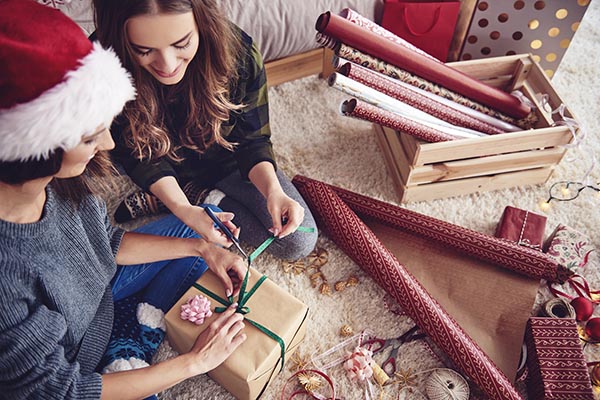It’s just a few hours until you go to a friend’s festive party – but instead of feeling excited, your heart rate has increased, you’re feeling nauseous, your palms are sweaty, and an intense feeling of doom has swept over you.
These are all common symptoms of social anxiety – a form of anxiety that is specifically related to social situations.
It’s where people often fear being judged, shamed and ostracised by others at the party or event they are attending.
“There’s no one-size-fits-all with social anxiety,” says our member Sally Brown.
“Someone may be fine socialising with close friends but feel so anxious about meeting new people that they go out of their way to avoid it. For others, anxiety is triggered by large groups of people, or by situations where they feel they may be put on the spot.
Added pressure
“There can be a feeling of added pressure to socialise during the festive season and it can feel like a minefield to navigate for people with social anxiety.
“When it feels like everyone around is enthusiastically embracing festive socialising, you can feel like an outsider and very alone with your problem,” adds Sally, a coach and therapist.
It’s normal to feel apprehensive before some social situations – but if this anxiety is limiting your life or causing you distress regularly, it’s worth seeking help.
Therapists can work with people with social anxiety in different ways.
They can help you to reframe how you think about social situations and whether people judge you.
Accept feelings
Or they can help you to get in touch with your values so that you accept uncomfortable feelings rather than resisting or avoiding them.
“A therapist could also help explore your personal triggers for anxiety and dismantle unhelpful beliefs such as ‘everyone must like and approve of me’,” she added.
Sally warns against using temporary solutions to cope with social anxiety – such as drinking heavily or avoiding going out.
Avoidance can make social anxiety worse, she says.
“You never get to prove to yourself that you can tolerate uncomfortable feelings and survive. Avoidance is a short-term solution but it can create longer term problems.”
She recommends several more sustainable coping strategies that can help you overcome your social anxiety.
Coping strategies
- Talk about your feelings to someone you trust. You’re not the only one who feels this way and you may discover that even outwardly confident people have doubts and fears about their social skills. Having a support person alongside you can also make it easier to go to social events.
- Scale how bad you imagine a social event will be before you go out of 10 (with 10 being the worst). Then rescale it afterwards and compare your prediction with the reality.
- It’s tempting to turn up late to events when you are feeling anxious but this is actually harder than turning up early, which means you don’t have to walk into a crowded room. You could also offer to volunteer to help the host.
- Practise a calming breathing exercise for a few minutes every day, such as 7-11 breathing (breathe in to a count of 7, and out for a count of 11), such as when you’re waiting for the kettle to boil or when you’re waiting at traffic lights. The more often you do it, the more effective it is at calming a hyper-regulated nervous system, so it’s like an SOS treatment that goes with you everywhere.
- Set a time limit on how long you will stay at an event. You could start by staying for just 20 minutes for instance. Then, the next time, try to stay for five minutes longer. Make sure you have an ‘exit strategy’ i.e. you’re not dependent on waiting for someone else to get home. Feeling trapped will increase your anxiety.
- If your anxiety revolves around being stuck for something to say, think of a few suitable topics or conversation starters before you go. Keep it simple. Questions such as, ‘How do you know the host?’ or ‘What’s keeping you busy these days?’ can be good conversation starters.
To find a counsellor or psychotherapist who can help you with anxiety, visit our Therapist directory.

How to avoid social burnout this Christmas and New Year party season
Our member Louise Tyler featured on BBC Radio 4’s Woman’s Hour talking about social burnout

Five tips to avoid stress at Christmas
BACP counsellor Natasha Page has some advice on how you can have a stress-free festive season

Anxiety
What is anxiety? How do you deal with anxiety or help someone with anxiety? BACP member Caz Binstead explains how counselling can help.
